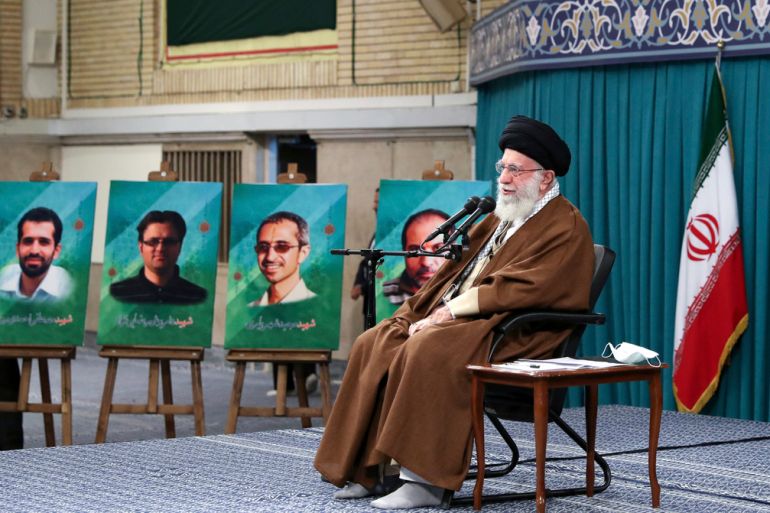Iran’s Khamenei demands Israel stop bombardment of Gaza
Iranian leader accuses Israel of committing ‘genocide’ in its continuing assault on the besieged Gaza Strip.

Iran’s Supreme Leader Ayatollah Ali Khamenei has accused Israel of carrying out a genocide against Palestinians in Gaza and warned Israel that it must pull back from its attacks on the besieged territory.
Speaking on Tuesday Khamenei said Israeli officials should face trial for their actions in Gaza and warned that “no one can stop” forces opposed to Israel if it continues its assault.
Keep reading
list of 3 itemsNo painkillers, water, food shortages: What to know about Gaza situation
Israel’s Gaza relocation order could be ‘crime against humanity’: UN
“If the crimes of the Zionist [Israeli] regime continue, Muslims and resistance forces will become impatient, and no one can stop them,” Khamenei said. “The bombardment of Gaza must stop immediately.”
“Regarding the situation in Gaza, we all have a responsibility to react; we must react,” he said.
Iranian officials often use the term “axis of resistance” to refer to a network of Iran-backed armed groups throughout the region that includes Hezbollah in Lebanon.
Iran’s Fars News Agency also reported that Islamic Revolutionary Guard Corps (IRGC) Deputy Commander-in-Chief Ali Fadavi warned of further action by Iran-backed groups across the region.
“The resistance front’s shocks against the Zionist regime will continue,” he said.
Israel has pounded Gaza from the air since Hamas launched a surprise attack from Gaza on southern Israel on October 7, when hundreds of Hamas fighters breached the Israeli fence that surrounds Gaza and killed at least 1,400 people, mostly civilians, according to Israeli authorities.
After the attack, Israel cut off food, water, and electricity to the more than 2.3 million residents of Gaza and launched an aerial assault that has destroyed entire neighbourhoods, killed more than 3,000 people and wounded 12,500 others, according to Palestinian authorities.
The question of potential expansion of the fighting to include not just Hamas, the Palestinian group that governs Gaza and receives some support from Iran, but more formidable Iran-backed groups such as Hezbollah in southern Lebanon, has loomed over the 11-day war.
Iranian President Ebrahim Raisi said on Monday that supporting the Palestinians was Iran’s foreign policy priority but that the armed groups make their own independent decisions.
Israel has said it intends to destroy Hamas and has mobilised hundreds of thousands of military reservists ahead of an expected ground offensive on Gaza. Military experts have warned that any ground offensive into densely populated areas of Gaza would be extremely challenging and could potentially lead to heavy losses on both sides.
The Israeli military suggested on Tuesday that it was considering other options as it prepares for “the next stages of the war” against Hamas.
“Everyone is talking about a ground offensive, but it could be something else,” Israeli army spokesperson Richard Hecht said on Tuesday without providing further details.
“Any ground operation [by Israel into Gaza], starting such an operation, that could be a trigger” for other armed groups to join the war, Mahjoob Zweiri, a professor at Qatar University, told Al Jazeera.
The United States has sought to deter Iran-backed groups from joining the war, moving two aircraft carriers to the eastern Mediterranean and putting 2,000 of its troops on deployment alert. Israel has warned that any party that joins the fighting will pay a heavy price.
But a widening of the conflict could also cause considerable problems for Israel, which would be faced with the prospect of barrages of missiles from Hezbollah’s considerable arsenal and a two-front war that could stretch the capacity of its forces.